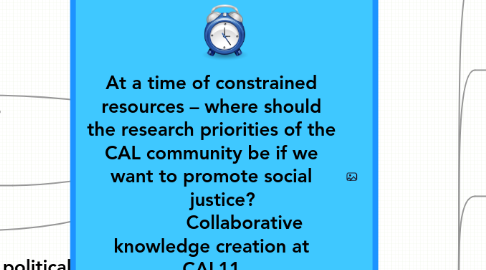
1. Increasing exposure to different political systems and the ways in which they operate
2. Supporting the case for women using ICTs
3. Reducing the digital divide
4. The commercialism of learning artefacts
5. Impacting on the indigenous culture
6. Digital safety issues
7. Rural and urban challenges
8. Improving job opportunities
9. Changing pedagogies and/or reinforcing information transmission
10. What are the CAL community priorities?
10.1. Privacy
10.2. New ways about valuing things
10.3. Futures for teacher education
10.4. Fragmentation of Education Technologies
10.5. methods and methodology
10.6. Play programming
10.7. Rethinking the digital divide
10.8. The fragmentation of the research community
10.8.1. People and projects are in silos.
10.9. Social and political issues
10.10. New node
11. Which projects take account of constrained resources?
12. New research tools
12.1. Using collaborative concept mapping as a means of involving teachers as co-researchers Preston/Leask/Pachler
12.2. Group discussion on methodologies recorded by Professot Loveless, University of Brighton
13. 'Google Days' for learners in the community - no teachers, but vygotskian groups working on own projects (using new microbroadcasting technologies to distribute content at neighbourhood level).
13.1. I like the notion of neighbourhood level learning. We are learning more about the issues of social bonding in online contexts - that strong ties are embedded in RL not in VL, so combining RL and VL through neighbourhoods seems an interesting strategy to get the best of both sources of knowledge and action.
14. Who is working in the field at CAL11?
14.1. Ros Sutherland
14.2. Keri Facer
14.3. Lindsey Grant
14.4. Bozena Mannova
14.5. Jolly Rubagiza
14.6. Alphonse Uworwabayeho
14.7. Christine Plesh
15. Dear knowledge creators, feel free to add and move nodes as the debate progresses
16. Key points
16.1. The researcher may not agree wih the priorities of a 'disadvantaged community'
16.1.1. Ros Sutherland
16.2. We should be teaching about programming as much as about application
16.2.1. Reference George Auckland
16.2.1.1. Some discussion about this on the ITTE Mailing list (see http://itte.org.uk/) and of course CAS is addressing this in more specific ways (see http://www.computingatschool.org.uk/)
16.2.2. Group discussion recorded by Anne Jones: Open University
16.3. we should be obsessed with curriculum content especially creationism for 10 year olds- we can teach evolution to 10 year olds using a computer
16.3.1. Richard Noss
16.3.1.1. Presumably this means we should NOT be obsessed with creationism, but instead with evolution?
16.4. We should be more politically aware as a community
16.4.1. Neil Selwyn
16.4.1.1. Just read Net Delusion: that's a good start
16.5. We need to join up with other disciplines in order to ask the right research questions about the impact on young people of digital technologies
16.5.1. Jean Underwood
16.6. Communities do not like to be called disadvantaged
16.6.1. Ros Sutherland
16.7. Technology can open up new kinds of knowledge that cannot be developed in any other way....
16.8. Do we focus on classrooms or class; education or social sciences- or both?
16.9. What are the implicit assumptions we are making about our resesearch?
17. Debate speakers
17.1. Charles Crook
17.1.1. A narrative of hope:
17.2. Neil Selwyn
17.2.1. People in CAL do get 'social justice' but this does not come out in the research narrative which has a very instrumentsalist approach.
